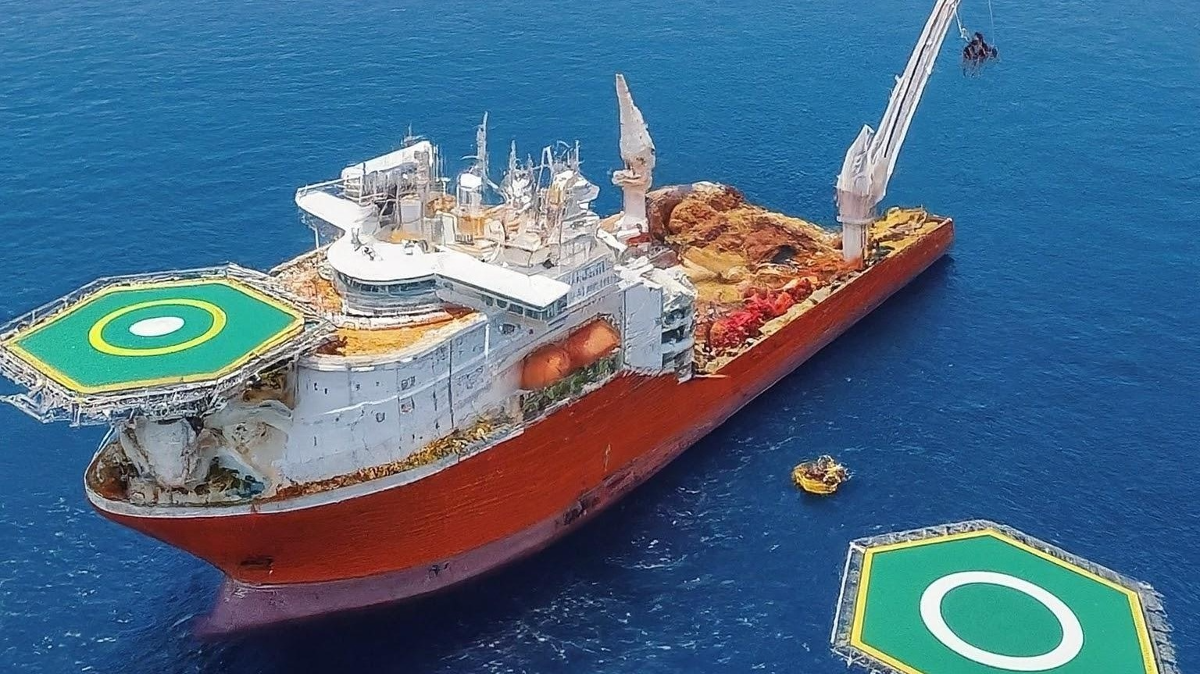Less is known about the deep sea than any other place on our planet.
Currently, approximately only 23.4% of the sea floor has been mapped and just about 5 percent of the ocean floor has been charted by scientists despite it making up 71 percent of the earth’s surface. The ocean occupies 91 percent of habitable space on earth and is the largest ecosystem our planet has.
The ocean has a critical role to play in the balance of our rather delicate ecosystem and knowing more about it is in the interest not just of marine life and biodiversity but indeed of all life on earth as we know it.
The earth’s five ocean basins (Atlantic, Indian, Arctic, Pacific and Southern Oceans) hold 94 percent of the earth’s wildlife and 97 percent of all water on the planet. It is therefore easy to see why the blue horizon continues to fascinate explorers and scientists.
Despite there being major concerns about mining activities in the seabed, it is projected that by the year 2030, deepsea mining will be commonplace, and African states with coasts are set to make sure that they reap the benefits of these activities.
Deepsea mining refers to the extraction of minerals at a depth exceeding 200 meters.
According to the European Commission proposal for the terms of reference guidelines for seabed mining, ten percent of the global annual mining output will come from seabed mining by 2030, and this will see turnover jump from virtually nothing currently to €10 billion.
Such numbers and projections have certainly whet the appetite of deepsea mining companies, which cannot wait to begin plundering the seabed for metals and minerals.
At what cost though? Isn’t the risk of losing certain wildlife species irreversibly and causing detrimental disturbances in carbon stores (further aggravating climate change) not worrying enough to inspire caution?
We are dealing with a deleterious concoction of climate emergencies at the moment, and if one were to speak plainly, deep sea mining, at this particular time, is the worst idea Africa can turn to.
Demystifying myths about seabed mining
In a bid to make African countries warm up to the idea of seabed mining, PR machines run by rich mining companies have come up with some myths about the activity.
The goal is to make the idea seem palatable and help them get a foot in the door, then a hip and a shoulder, before eventually there is no going back on the subject of underwater mining.
Myth 1: New phone technology requires seabed mining to succeed
The world has gone completely digital, and the demand for ever-evolving smartphones and laptops with newer capabilities is on the rise. Mining companies interested in seabed mining are now using this as a selling point to rip out what lies under our waters.
Tech giants are thriving without deepsea mining and continue to release new technology into markets every year. In fact, some of these companies have joined environmentalists in their efforts to put a stop to the persistent call for miners to embark on deepsea mining.
A circular economy is what has been proposed as a lasting and sustainable solution for the technology industry. These companies should use e-waste to do away with the take-make-waste system that is seeing electronic waste become the fastest-growing type of waste in the world.
Recycling and better innovation to eradicate the use of metals and minerals should be what we are discussing. Not seabed mining. Tesla and Panasonic have already made a commitment to phase out cobalt which is one the minerals that deepsea miners are targeting.
Myth 2: Prevention of the contravention of human rights
There are many dangers when it comes to mining on land. Perilous working conditions, use of child labour, health hazards to workers who often do not have proper PPE, as well as harm caused to the environment.
Companies such as The Metal Company are now using this as a starting point for deepsea mining, claiming that this form of mining is the solution to all this.
African countries and other targeted nations must remember that there is no guarantee that one would directly lead to the end of the other when it comes to land and sea mining. Resource exploitation would just be as rife if not worse.
Myth 3: the green solution
This is laughable but yes, some mining companies are actually promoting seabed mining as a green solution for the planet. How? Well, their unique selling point is that the minerals from the sea can be used for green energy solutions like electric car batteries, solar panels, wind turbines and other renewables.
DeepGreen (now The Metals Company) is one such company whose influence and affluence was seen when in 2019 it was able to make Nauru, a Pacific Island nation, break UN protocol and cede its seat to Gerard Barron, the company’s CEO. This happened during a meeting of the ISA council in February of that year.
Leading the rebranding camp, Gerard was quoted in an interview as saying,
“Personally, I get very uncomfortable when people describe us as deep sea miners. At DeepGreen [now The Metals Company], we don’t think of ourselves as developing a mining business. We are in the transition business—we want to help the world transition away from fossil fuels with the smallest possible climate change and environmental impact. This is the global public good we hope to create.”
Companies (mining and some in the oil and gas sector) are abusing the well-intentioned and much-needed transition away from fossil fuels and hiding behind it to fund their own selfish monetary interests.
Dangers of deep-sea mining
The final frontier – That is what the seabed is for humanity. Scientists are getting more and more eager to explore this largely untouched frontier that is bursting with life.
The current gold rush by mining companies salivating at the prospects promised by the ocean bed promises nothing but destruction.
Virgin deep sea ecosystems would be perturbed leading to a ripple effect in fisheries industries, food security and the livelihoods of millions as well as compromising the ocean’s nutrient cycles and metal and carbon balance.
In 2019 the sea pangolin was the first coral species which exists only in deep sea heated vents, to be characterized as endangered because of the potential risks of DSM. This and other precious coral reefs stand to be completely destroyed by miners, purposely or accidentally.
Scientists are yet to fully understand the complex relationship between the biochemical, biological and geophysical processes that make up the ecosystem of our waters which are highly sensitive to any interaction from human activity.
Deep sea mining stands to damage biota, leading to irreversible loss of biodiversity, fragmentation on the seabed and detrimental changes in the habitat of sea wildlife.
Furthermore, habitats in the depths of our seas are unaccustomed to the vibrations, noise and levels of light that mining would invasively introduce.
There is also the ever-present danger of these endeavours eventually only truly benefiting a minority of nations and corporate entities, and therefore there is no guarantee of equitable distribution of realized profits.
Certain nations like China, Russia, France, South Korea, Germany, Japan and India have already occupied vantage points on the benefits spectrum.
Conclusion
Laudable perhaps is the fact that Africa is the only region that thus far hasn’t sponsored any entity to explore what is known as ‘the area’. Be that is may, interest, with all the benefits being fronted by miner PR, is rapidly growing.
Professor Egede from Cardiff University of Law and Politics says in part, “Africa’s will to pursue deep sea bed mining has been uncertain, but interest in the subject is growing.”
He contends that the African continent should play a bigger role than it has in the past in steering any future debates on DSM. A clear action plan is required to transform ideas into action.
The ISA (International Seabed Authority) is a UN multilateral regulatory body and currently, it has approved 30 licenses for exploring minerals in sea beds that are located outside national jurisdiction.
In September 2021 there was an overwhelming vote supporting the moratorium on DSM and ISA reforms. Delegates proposed that the pause should be upheld until a thorough impact assessment on the globe is completed.
This will hold but only for a while, soon, economic interests, political influencing and rigorous false rebranding will take over and companies will get the go-ahead to exploit minerals and metals that are the very foundation of the ecosystems of our waters.
There has to be a collective call to hold out for as long as is possible to see to it that what took nature millions of years to delicately create is not wiped out in a single day. Deep sea processes take eons and whatever is destroyed by this insane campaign will NOT be recovered within our lifetimes.
Cover Image Generated using Google Imagen



